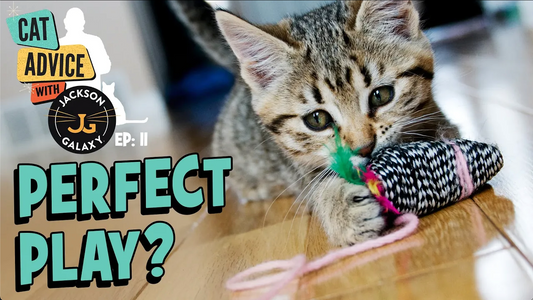A note about this series: Introducing cats to other animals can be a tricky affair. That said, it can
also be smooth sailing, with very little potential conflict. And, it could fall somewhere between the two. Every animal
is an individual, as is every human and every household. That’s exactly why I’ve made this series exhaustive in detail;
I want to serve as many of those individuals as possible, and set everyone up for the best life possible.
Please don’t think that just because I’ve covered every angle, that means that cats are better left living on their own.
I believe strongly that,
by and large, cats should be with other cats. You may find that to serve the needs of
both humans and non-humans in your home, you can move through some of these steps with ease. Great! And it’s equally
fine if it takes awhile to get from beginning to end. Just remember: in the world of relationships, nothing is ever
one-size-fits-all. It’s a process best served by being patient, empathetic, and mindful.
Now, let’s do this…with light, love and Mojo!

Episode Four: Love at First Sight
In
Episode One, we
covered the three fundamental steps to take before you bring your new cat home. In
Episode Two, we talked about the concept of
base camp and its invaluable role in creating an easier transition for your new arrival. In
Episode Three, I detailed the specific
feeding ritual I recommend to get us one step closer to the prospects of a truly harmonious, face-to-face introduction.
Now, at long last, let’s ease into that critical step of establishing visual access.
Step Four:
Establishing Visual Access
With both cats now acutely aware of the other’s scent, it’s time to let the cats actually see other. The work that
you’ve done up to this point has resulted in predictable behavior between the two cats and a cordial (or, at least
tolerant) “scent handshake” at every meal. It’s a mistake, though, to assume that they will be just as cordial once the
visual element is introduced. Instead, begin at the beginning and reset the Challenge Line:
1. Initial Eye Contact: Take the feeding line all the way back to where they can see one another and
eat with little or no disruption. And now, do the Challenge Line process all over again. But first, you have a choice to
make. Do you simply crack the base camp door, or set up a pet gate or screen door?
Option One: It’s often fine to just crack the door. You can grab a couple of those triangular rubber
door stoppers from any hardware store and place one either side of the door (to guarantee that no one’s going to swing
that door open). Or a hook-and-eye door latch also works just fine to keep the door slightly ajar. There should be only
enough space that if some kind of swatting or swiping breaks out, it can happen with no damage done.
Option Two: In my experience, the better option is to introduce the cats by either using a pet gate or
a screen door. A pet gate works better than a baby gate because pet gates are high and have a walk-through door in them,
so that the human doesn’t have to disassemble the base camp door every time he wants to cross that threshold.
2. Raising the Curtain: Once you’ve decided on whether to use a pet gate or screen door, drape a
blanket over that gate or use clothespins to hang it from the screen. This gives you a much greater sense of control
over the degree of visual access because you can “raise the curtain” gradually over a period of time. The curtain allows
you to start with the absolute bare minimum of visual access. For many cats, this added layer of security makes all the
difference in giving them the confidence they need to take that next paw over their Challenge Line.
3. The “Screening” Process: As you’ve seen on my show, I prefer to install a screen door at the base
camp door. That sounds like a very big undertaking, but in reality, it’s not. The costs of a screen door with sturdy pet
screening, and the elbow grease to install it by taking your door off the hinges and putting this door in, are fairly
minimal. And you can even do it in a rental apartment. I highly recommend going with a screen door because it allows for
control of access in a way that nothing else can. There are no gates to jump over, no doorstops to budge out of the way,
and no worry about how high the crack might be under the door.
Extra Cat Daddy Tips
Whichever method you use to introduce visual access, the following tips will help:
- With some cats, you might have to start with no visual access, and then move them into each other’s sight line
slowly. (The blanket technique works well for this.) This then becomes the first Challenge Line to cross—moving from
“I know you’re there but can’t see you,” to actually eating while in the sight line of the other.
- Oftentimes, a glitch occurs when one cat eats like a vacuum cleaner while the other picks, pecks, and walks away.
You can use a slow feeding bowl to buy you more time on the vacuum cleaner’s side, while making sure not to provide
too many treats between meals and choosing “Jackpot” food for dinner for the finicky diner.
- When you just crack that base camp door, even if you maximize the angle so the cats are almost looking at each
other, it still has a hunting game vibe to it, because each cat gets only glimpses of the other cat. With the screen
door, there is no question about the message: all body language is obvious.
- I’ve seen this process take weeks. But I’ve also seen this process take just a few days. Your cats will tell you
when they’re comfortable. Knowing what your cat’s body looks like on the side of comfort and on the side of
challenge really tell you everything you need to know moving forward.
Once you get to the point where you’ve raised the curtain completely, allowing total visual access while the cats are
eating fairly closely to each other, then you’re ready for our final step.
Note: As you evaluate your cat’s progress, keep in mind that it’s not reasonable to expect two stranger
cats to comfortably eat within six inches of each other—even if there’s a door separating them—but you want to get as
close as you can.
In Episode Five, we'll put the
finishing touches on our introduction process with our Eat Play Love ritual.
Even though this series might seem in depth, you ain’t seen nothing yet! There is actually much more to be found in the
chapter that this has been excerpted from in my new book,
Total Cat Mojo.
Jackson's Related Articles












